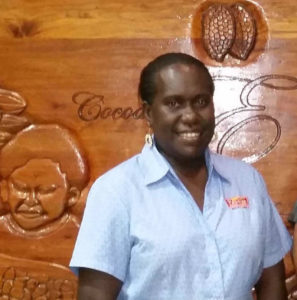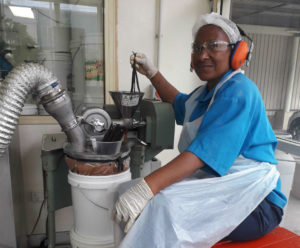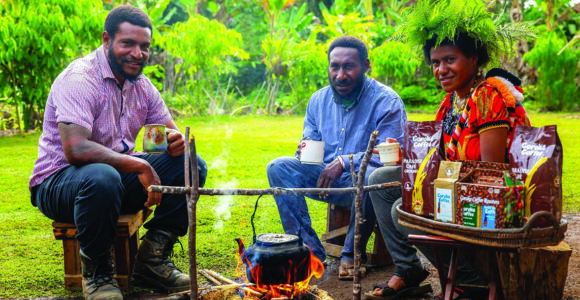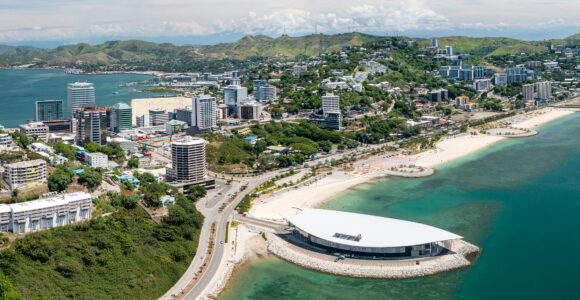Papua New Guinea’s vanilla sector success relies on education and regulation
PNG was the second-largest global grower of vanilla last year, producing about 250 metric tonnes, but leading processor and exporter, Paradise Spices, is calling for regulation of the sector to resolve supply and quality issues. Karina Makori, the company’s General Manager tells Business Advantage PNG inflated prices have halted production of vanilla products for the past nine months.
Unable to access the necessary volume and quality of vanilla beans, Paradise Spices, a subsidiary of PNG’s largest food manufacturer, Paradise Foods, is calling for regulation of the sector to resolve supply and quality issues.
Concerned the sector lacks sustainability, Paradise Spices’ General Manager, Karina Makori, says local vanilla bean farmers need training to help guarantee its long-term success.

Paradise Spices’ Karina Makori
Aggregator
Paradise Spices recently consulted a local aggregator to help solve its supply and quality issues by assisting the company with buying vanilla beans for its vanilla products.
The company produces a range of 100 per cent pure vanilla products, including vanilla paste, vanilla powder and vanilla extract.
Makori says the aggregator has a good relationship with growers in the Sepik region, and will help ensure regular supply of vanilla beans for a fair price.
As part of this arrangement, the aggregator will buy the vanilla beans directly from farmers in the region and work with Paradise Foods to transport the vanilla to Port Moresby for processing.
‘Most of the purchasing happens in remote villages. Farmers generally don’t have bank accounts, which makes the buying process risky and difficult for Paradise Spices.’
‘The aggregator will do the buying for us and have a long-term relationship with the farmers, which we hope results in a fair price, consistency in quality and regular supply,’ she says.
Prices in the Sepik region are around 1,500 Kina per 1 kilogram of cured vanilla beans, and Makori says the price is relatively the same regardless of quality.
With farmers often selling both A Grade and B Grade beans as A Grade, Paradise Spices spends considerable time re-sorting beans after purchase.
‘The quality of the vanilla bean is a big challenge for Paradise Spices.’
Training essential
Makori stresses that training is needed for farmers on how to grow, harvest and cure the beans correctly.
Growing vanilla requires a high level of diligence throughout the entire process and is labour intensive.
The plants start flowering three to fives years after planting, and reach maximum production after seven to eight years.
Curing takes an additional four to six months and adds the most value to the beans, which is a technique that farmers need to be trained on, Makori says.
The first aggregator employed by the company is a local man with a significant understanding of the vanilla sector and local market.
Makori says the aggregator is keen to ensure the long-term sustainability of the sector in Papua New Guinea through educating farmers on how to look after their crop.
Training in financial literacy will also be provided by the aggregator, which will provide farmers with the skills they need to manage their income.
‘There has been a lack of education for a long time, which has led to farmers not caring about the sustainability of their crop and how to work with local companies to develop a strong market for vanilla.’
Extension services
With more farmers seeking to get involved, Makori says it would be beneficial if the government provided extension officers to deliver training and support, similar to the coffee and cocoa sectors.

Operator milling vanilla beans: Credit: Paradise Spices
Providing ongoing training carried out by extension officers will give farmers the knowledge and tools to grow and produce quality vanilla beans that will do well in the market, Makori adds.
Pending the success of the first aggregator employed by the company, Paradise Spices hopes to develop a group of aggregators to work with in the future.
‘There is definitely a market for vanilla in Papua New Guinea, especially with the development of hotels, but there is also an export market that could be further advanced if the sector is regulated and the beans accessible.’
Makori says the unique flavour of Papua New Guinea’s vanilla is attractive to buyers.
With the right regulation implemented and training provided, there is a great opportunity for Papua New Guinea’s vanilla sector to develop globally and be sustainable in the future, Makori adds.





